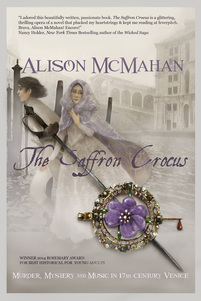 I'm thrilled to be joined today by Alison McMahan, author of The Saffron Crocus, a Young Adult novel set in 17th century Venice. From the synopsis: Venice, 1643. Isabella, fifteen, longs to sing in Monteverdi’s Choir, but only boys (and castrati) can do that. Her singing teacher, Margherita, introduces her to a new wonder: opera! Then Isabella finds Margherita murdered. Now people keep trying to kill Margherita’s handsome rogue of a son, Rafaele. Was Margherita killed so someone could steal her saffron business? Or was it a disgruntled lover, as Margherita—unbeknownst to Isabella—was one of Venice’s wealthiest courtesans? Or will Isabella and Rafaele find the answer deep in Margherita's past, buried in the Jewish Ghetto? Isabella has to solve the mystery of the Saffron Crocus before Rafaele hangs for a murder he didn’t commit, though she fears the truth will drive her and the man she loves irrevocably apart.  Sometimes readers ask me why I set my YA historical mystery/romance novel in Venice in 1643. Why 1643? Most novels set in Venice are set during its heyday, from the 1300s to the 1500s. Or they are set in Vivaldi's Venice of the 18th century. Or they are set in the 19th century, mirroring the society Henry James setting in novels like Wings of the Dove. But the 17th century in Venice doesn't get much love. Venice was in decline, in between its period of grandeur and the invasion by the Ottoman Turks and Napoleon. Periods of decline are historically just as interesting as periods of greatness. There is much we can learn from them. I picked 1643 Venice for seven special reasons: 1. THE BLACK DEATH. In 1630 Venice, and the rest of what we now call northern Italy, was hit by the Bubonic Plague. Eighty thousand lives were lost in just seventeen months in Venice laone. On the 9th of November, for example, five hundred and ninety-five died. These enormous fatalities greatly affected the city. Even the Doge, Nicolò Contarini passed away. I wanted my heroine, Isabella, to have lost her parents at the age of five to the plague, and to be fifteen at the time the story begins, so the date of the of the story had to be 1643. 2. THE BIRTH OF OPERA. Yes, I know most teens consider opera to be uncool at best, unmentionable at worst. But I'm an opera fan, so there's a little bit of "write what you know" here, and I was hoping that my own love of opera would communicate itself through the pages. The word "opera" itself is an Italian word – it means "labor" or "work" in Italian. Opera originated in Italy when courtiers decided they preferred the "intermezzi," the light-hearted singing and dancing interludes that broke up heavy Roman plays, to the plays themselves. Opera evolved from these Intermezzi. The first complete opera, "Euridice" by Jacopo Peri was performed in Florence in 1600. 3. MONTEVERDI: If, like me, you are a fan of what the human voice can do in song, then you are a fan of Monteverdi. At the time the story of The Saffron Crocus takes place, Monteverdi was the musical director of the chorus of San Marco's Basilica. Because I admire his music so much, I wanted to give him a small role. My heroine wants to sing for the chorus, but only boys can do that, and she uses various ruses to get what she wants, which pits her against Monteverdi. 4. LOST OPERAS: There is something so romantic about lost works of art. Of course, in the 1600s, opera performances weren't recorded. But the scores were written down. You'd think it would be easy enough to keep a score, and copy it over when you need to. But one of the world's greatest operas, L'Arianna, is a lost opera. All we have is one recitative from it, "Arianna's lament," which plays a key role in my story. 5. CASTRATI: Castrati were male singers who were castrated before puberty to keep their voice artificially high. In other words, the baroque world was so opposed to women singing that they preferred to castrate little boys (only a lucky few survived the procedure) rather than let women perform. I was fascinated both by castrati themselves – what were their lives like? And enraged by the idea that Venetian society would prefer to go that far rather than let women sing. A key character in the story is a castrati. 6. CONCERTO DELLE DONNE (consort of ladies). Women could sing in private homes. This practice started after Alfonso II, Duke of Ferrara, who established the first group of "amateur" singers to perform for him. They were considered "amateur" because they were women and could not perform professionally (that is, for pay), but in fact they were renowned for their technical and artistic virtuosity. I know professional musicians today who have tried to re-create some of their music and couldn't do it. My heroine sings in salons before she finds a way to sing professionally. 7. THE JEWISH GHETTO: The Jewish Ghetto in Venice was not the first, but it is where we get the name. The English term "ghetto" is an Italian loanword, which actually comes from the Venetian word "ghèto", slag, and was used in this sense in a reference to a foundry where slag was stored located on the same island as the area of Jewish confinement. I have always been fascinated by how the Jews lived in Venice, and almost half of the book takes place there. I could go on and on about what was special about Venice in 1643, as Venice is endlessly fascinating, but I'll stop there. Read the book, or better yet, listen to some of this music, preferably in Venice itself! Alison McMahan chased footage for her documentaries through jungles in Honduras and Cambodia, favelas in Brazil and racetracks in the U.S. She brings the same sense of adventure to her award-winning books of historical mystery and romantic adventure for teens and adults. Her latest publication is The Saffron Crocus, a historical mystery for young. Murder, Mystery & Music in 17th Century Venice. She loves hearing from readers. Feel free to check out her website, visit her on instagram, pinterest, tumblr, or on Facebook, or just send her a tweet! Her books can be found at Black Opal Books, AMAZON US; AMAZON UK.
1 Comment
|
Susanna CalkinsHistorian. Mystery writer. Researcher. Teacher. Occasional blogger. Categories
All
Archives
May 2023
|
 RSS Feed
RSS Feed